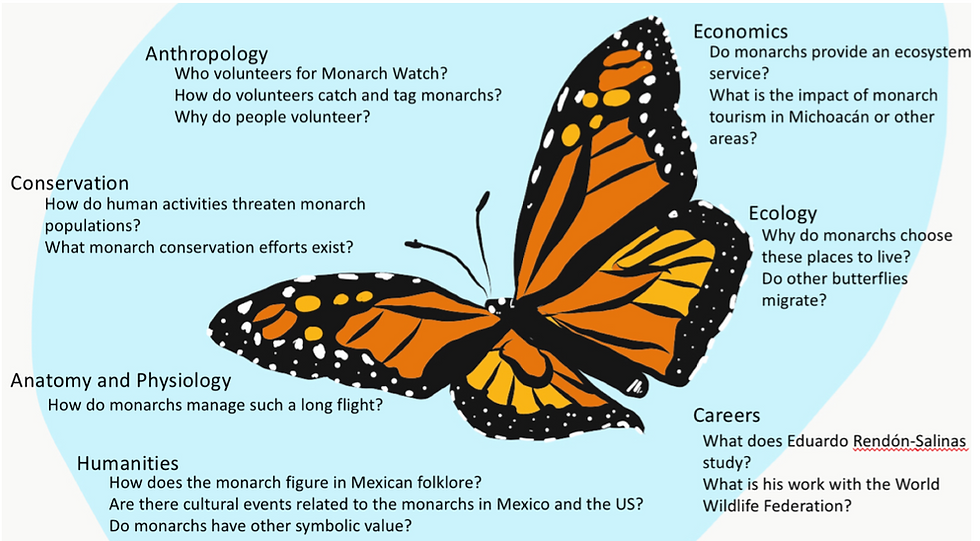Monarch Migration: an Interdisciplinary Inquiry
- Donna McDermott
- Dec 13, 2019
- 2 min read
Investigating Monarch Butterfly Migration
The goal of this exercise is for students to explore one of the many ways that academics gain information about the world. How do scientific studies connect to studies in other fields? How do ideas interact across disciplines?
📷

Part One
Watch the following video on monarch migration. What aspects of monarch migration are most interesting to you? You’ll investigate a question about monarch migration, research how academics answer these kinds of questions, and propose a study that would allow you to learn more about the topic.
Video: https://youtu.be/AN8-pNnvJ5s
1.What is one question you’d like to explore about monarch migration? You can develop a question of your own or choose a provided question. Provided questions are listed in the picture above and also in the link below. Write your question here and also on the board at the front of the room. Try to pick a question that is different from what other people in the room are asking.
2. Which academic discipline answers questions like yours (e.g. chemistry, art history, literature, biology, etc.)? If you’re unsure, ask.
3. How do academics in that discipline do research (e.g. conducting interviews, running scientific experiments, searching library archives, etc.)?
4. Find an answer to your question to the best of your abilities in about 15 minutes. Try to answer as specifically as possible. Use should Google Scholar to find academic sources to answer your question. You can also use a regular search engine, but make sure to record where the information is coming from. (It’s okay if the source is not academic- for example, someone’s opinion on Twitter may be useful to your answer. However, you should be clear about the fact that an idea you’re presenting comes from someone’s opinion on Twitter.)
It’s okay if you’re struggling to find an answer to your question. If this is the case, switch questions or gather as much useful information as you can and move on to the next part of this activity.
Once you have spent about 15 minutes on this, put a check mark next to your question on the board.
5. Identify one new question that your research has prompted, or specify your old question, if you couldn’t find an answer. How would an academic answer this question? Be detailed. (I.e. propose an experiment to answer a scientific question, come up with a few interview questions to ask as a social scientist, etc.)
Part Two
6. At some point in this class period, you’ll be prompted to find a classmate to discuss your exploration with. The two or three of you should explain to one another what you’ve learned so far. In what ways is your research related to one another’s? Have you come across any ideas that conflict? Any ideas that support one another? What can the academics in each of your disciplines gain from talking to one another, across disciplines?
7. How could you share the information you’ve learned in this activity with other people who aren’t experts in your discipline? For example, would you plan an event? Create an informative video or essay? Interpretive dance it? Write an essay? Describe what you would do, and why you think that format would be useful. Add as much detail as you have time for.


Comments